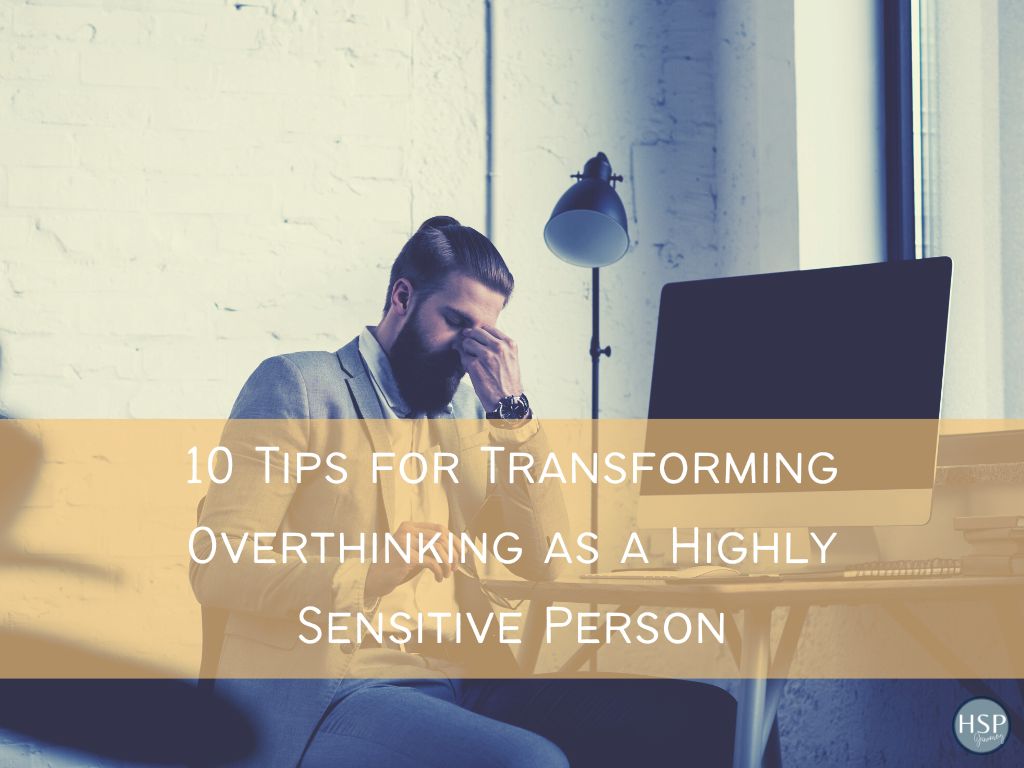Is it hard to shut your mind off and stop thinking? You are not alone. One of the defining characteristics of being a Highly Sensitive Person (HSP) is deep processing. It can leave us stuck in analysis paralysis, without reaching a conclusion or beginning to act. That’s why I’ve written these 10 tips for transforming overthinking as a Highly Sensitive Person.
There is hope for transforming your pattern of overthinking. I invite you to try the explore-experiment-integrate process based on my Singularly Sensitive approach to working with HSP clients.

Table of Contents
Explore What Sets You Up for Overthinking:
Tip #1 – Check Your Mind to Transform Overthinking
Many HSPs struggle with an overactive brain if they are in situations where they feel inadequate, insecure, or confused, or when they experience performance anxiety or imposter syndrome. Give yourself some distance from your thoughts, labeling them to yourself as “just a thought” before turning your attention elsewhere. Practice directing your thoughts to neutral topics that distract you, are mentally stimulating, or spark your curiosity. Redirect your mind to affirmations you can believe.
Tip #2 – Respond Directly to Your Emotions
You may notice that some emotions, like fear, embarrassment, shame, sadness, or grief, are harder to tolerate. Try to name your feelings to yourself. Remind yourself that feelings are not dangerous, bad, or wrong. Get support from loved ones, pets, nature, or spiritual/religious practices. You also can try using artistic or creative means to externalize your feelings and comfort yourself. Notice what helps you deal directly with your emotions, rather than ruminating about them.
Tip #3 – Tend to Your Body to Transform Overthinking
If we’re hungry, tired, sore, or ill, it is especially hard to muster up coping resources. Are there physical states that make you more vulnerable to overthinking? Be mindful of what your body needs so that your mind is easier to manage. Gentle ways to be focused on the present moment and tend to your physical needs include rest, drinking water, eating a healthy snack, stretching, getting fresh air, and looking away from screens to allow your eyes to relax.
Tip #4 – Nurture Your Relationships to Transform Overthinking
Interactions with other people can sometimes feed our overthinking, while at other times they can help us settle our thoughts. What patterns do you notice in your life? Are you worrying about actual or potential conflicts with others, setting boundaries, how we might be evaluated by others, or how to work through past relationships? See if you can reassure yourself that you can handle your relationships. Imagine what someone you respect or love would say to reassure and comfort you. See if you can turn that reassurance into self-talk to coach yourself through your overthinking. Nurture your relationship with yourself.

Experiment with Choosing to Act instead of Think
Tip #5 – Spirit of Experimenting, Not Perfect Action
Many HSPs struggle to act because they want to perfectly explore every possibility. Perfectionism feeds the misery of overthinking. Reframe acting as an experiment. You’ll use what you know to make an informed decision about what to action to try. Prepare yourself for the likelihood that your experiment will not yield a perfect outcome. Whatever happens, consider it data that you can evaluate and use to inform your next attempt. Allow change to be a process of ongoing improvement, not a search for perfection.
Tip #6 – Choose a Micro Goal to Transform Overthinking
What small action do you want to start with to transform your overthinking? Break it down, again and again, until you get to what I refer to as a micro goal. The wonderful thing about micro goals is that they are so small, that you need to work hard to fail to meet them. If you notice that you start ruminating if you’re thirsty, you might start by taking one extra sip of water after you brush your teeth in the morning. Build up to an extra sip twice a day, then keep going. By deliberately starting small, you have room to improve and build on successes, not deal with disappointment or failure.
Tip #7 -Give Yourself a Deadline and a Reward for Acting
Most of us need a timeline to shift us out of overthinking. Be realistic about your deadline. Then find a small but meaningful way of rewarding yourself for taking action—especially an imperfect action. Focus on the process of acting, not just the outcome.
Integrate What You’re Learning About Yourself
Tip #8 – Journal to Transform Overthinking
Keeping a journal can be a way to “brain dump” so that you’re less likely to overthink. Journaling is also a way to get some distance from your experience and take stock of the progress you’re making. Experiment with ways to make your journaling process helpful as you deal with overthinking.
Tip #9 – Plan for the Next Time
As you engage with the process of exploring and experimenting with your overthinking, you’ll learn a great deal about yourself that can help you plan for when it happens in the future. Take stock of what patterns emerge in your thoughts, feelings, behaviors, and relationships. See if you can aim for a small improvement the next time your mind gets stuck. Then aim for another small improvement. Notice and celebrate your progress over time.

Looking for an HSP-Trained coach to help you align your life with your priorities?
Through my Highly Sensitive Person (HSP) certification with the Nickerson Institute, as well as being an HSP, I offer HSP coaching to develop specific goals around your HSP needs. We HSPs frequently deal with anxiety and overstimulated nervous systems that prevent us from achieving peace and attaining our life goals. HSP coaching with me includes a detailed review of your sensitivities and a mutually-desired plan for growth and management of this superpower to shift negativity and begin seeing yourself as the hero of your own story. (Affordable monthly coaching begins at $150/month.)
Tip #10 – Balance Self-Acceptance and Change
I wish there were a cure for overthinking; I’d sign up for it myself. Since there isn’t, please consider how much attention you want to give it. Perhaps you’ll find that, if you can make progress in certain areas of overthinking, you are less bothered by when it happens. I can gently chuckle at myself when I spend hours thinking about the best way to rearrange my furniture because I’ve grown better at stopping myself from overthinking my career or relationships.
Finding a balance between self-acceptance and change can make a tremendous difference in how you live with your HSP trait of deep processing. Paradoxically, accepting yourself and your HSP deep thinking can make it easier to change how it shows up in your life. Allow yourself to be open to both constancy and transformation and you may be surprised at how you grow.
How do I know if I’m a Highly Sensitive Person (HSP)?
This is a great question. Many people who are highly sensitive feel that they were not understood as children. They were frequently told they were too sensitive or cried too often. You can reference our list of HSP quizzes to see how you score and this can inform whether or not you are a Highly Sensitive Person.
Be sensitive, be free
*This post contains affiliate links and I will be compensated if you make a purchase after clicking on my links*





[…] your sensitivity trait or empathic nature. When you take time to center yourself through positive self-care, often, it’s possible to reverse the slide downhill and regain strength and confidence. Dr. […]